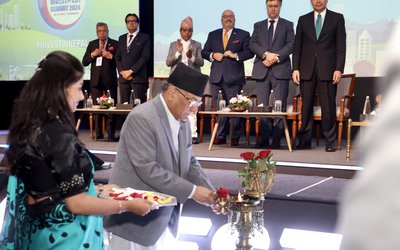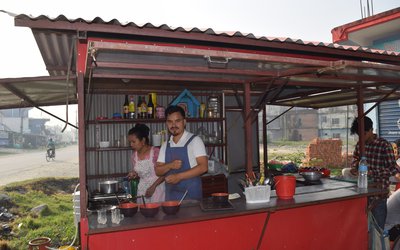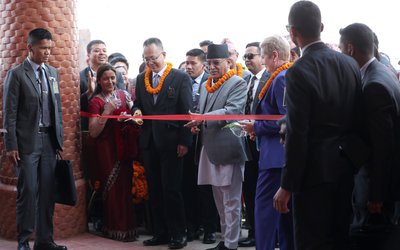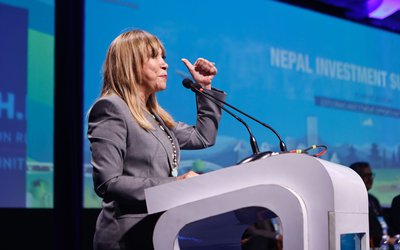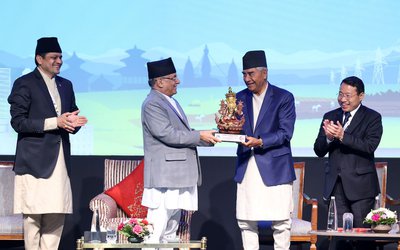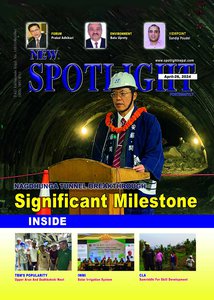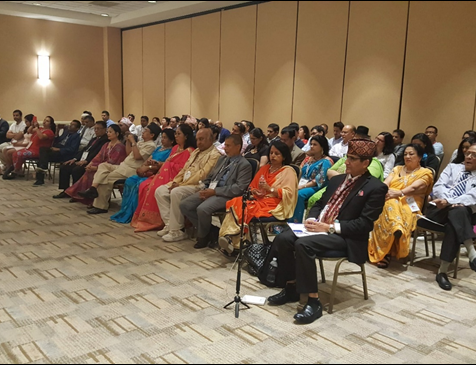
(Caption: Nepali diaspora community members attending a forum on, "Diaspora's role in Nepal's development," Baltimore, Maryland, July 5-7, 2019.Photo: Bijay Thapa )
The Context
Over the last several years, the number of Nepali professionals educated and trained, residing, and working in the United States (US) has increased many fold. According to one estimate, the total number of Nepalis in the US could be as high as 300,000 individuals. This represents the many individuals who have made the US their second home through the US Diversity Visa program, students who have come on their own and settled here in the US, as well as other professionals engaged in diverse work areas, including at academic institutions. Yet others made the US their second home after being pushed out of Nepal due to the political upheaval of the 1990s. These multiple channels have resulted in the creation of a reservoir of highly-educated, well-trained,and experienced professionals of Nepali origin in the US, their second home.
The majority of this population in the US is also keen to ‘give back to their community.’Surely, some members of the diaspora are already making significant contributions to their families and communities back in Nepal. Still, many others possess a high level of interest and the intention to contribute to development in Nepal.Fortunately, on the Nepal side, there is growing appreciation and recognition that the "invisible" force (provided by the Nepali diaspora) can make a significant contribution to diverse fields of development in Nepal. A strong testament to this sentiment is the convening (jointly by the Government of Nepal and the Non-Resident Nepali Association) of the Global Knowledge Sharing Conference held in Kathmandu in October of 2018. Recently, the Government of Nepal also established a "Brain Gain Center" at the Foreign Ministry in Kathmandu with the objective of facilitating and harnessing the expertise of the Nepali diaspora. These are certainly positive milestones.
The Challenge
Given the availability of knowledge/skills and the interest in giving back to Nepal on the US side, along with the recognition ofneed and receptivity on the Nepal side, the next step is determining how to realize this common goal – accessing the skills and expertise of the Nepali diaspora. At the moment, a variety of different approaches/models are currently in practice. Let me mention a few.
One approach that has been in practice since the early 1960s between the US and Nepal is government to government assistance in areas of mutual interest and priorities. Some of members of the Nepali diaspora have been engaged through this approach over the years. Global organizations based either in the US or elsewhere have become another important source, particularly because increasingly large portions of the Nepali diaspora are engaged in and working for Nepal's development. This form of engagement may go through the government or through non-governmental organizations (NGOs). Academic institutions have been another important source, wherein members of the Nepali diaspora identify and develop priority projects, and contribute to various areas of development. This modality of expertise could flow through academia, government channels, or the private sector. Finally, the private sector remains an important source for accessing and utilizing the expertise of the Nepali diaspora in Nepal. This particular modality includes contributions from an individual member of diaspora to individuals or organizations/institutions in Nepal. Additionally, this could also be assistance from an institution/organization to individuals or organizations in Nepal.My ownpro bono work for and in Nepal over the last three years falls into this particular modality.
Aside from these approaches, there is probably a large segment of the Nepali diaspora, particularly here in the US, who are not only highly educated and extremely experienced, but are also willing to share their knowledge and experience in Nepal. However, many of these individuals may not be in a position to travel to Nepal for knowledge/skill sharing, or may not have any organizations willing to sponsor their expenses. In my opinion, unless and until we are able to identify and develop a pool of financial resources to access the diaspora’s expertise, the idea of mobilizing a significant portion of the diaspora to engage in Nepal's development will still be limited largely to rhetoric. Therefore, it behooves us to find a mechanism for translating this rhetoric into action.
To this end, I feel the time has come to advocate for and establish a fund that might be called something like the 'Nepali Diaspora Knowledge and Skill Fund'. Such a fund could be set up on a bilateral or multilateral basis. In the case of the US, a small portion of the funding that goes from the US government to Nepal could be earmarked specifically to access the expertise of the Nepali diaspora. A joint committee/board could be set up to review and allocate funds for priority projects. Under this scheme, if a member of the diaspora can, and is willing to work on a pro bono basis on a priority project, then such a person's salary time and other expenses could be credited to the ‘Nepali Diaspora Knowledge and Skill Fund,’and in turn the fund can then use that credit to sponsor another member of the diaspora. This is also one way to ensure the fund is continually replenished.
With the establishment of the "Brain Gain Center" at Nepal's Foreign Ministry, the development of the fund seems to be another essential building block. Further, in view of schemes like the Millennium Development Challenge that recently provided some $650 million for Nepal's development work,in addition to the millions of dollars that flow from USAID to Nepal’s government every year, putting aside say, $1 million is not really a large amount. The US government spends millions of dollars through the Fulbright Program already. What is required is the will and commitment to expand the horizon and explore new possibilities.
New challenges call for new possibilities. I believe, the time has come to think of novel approaches existing "outside the box". The experience gained from such a support mechanism could be applied to make it better and more effective down the road. The establishment of the fund seems imperative to access ad mobilize the vast reservoir of the highly educated and skilled Nepali diaspora in the US and elsewhere.
Finally, the diaspora experts’database currently being compiled by the Non-resident Nepali (NRN) Association,with the active engagement of Nepal's Foreign Ministry, is certainly a welcome step; and it must be appreciated. However, it is just the first step. Another important milestone is to explore how a system may be developed and introduced to ensure the contributions made by a person or an institution is appropriately recorded.
And, an even bigger challenge is being able to answer the question "so what"? That is, it would be important to assess the effect or impact a particular set of knowledge exchange or skill set transfer brings about. In this context, in my opinion, it would be important to be able assess the immediate, medium term, or longer-term effects or impacts of the contributions made by the diaspora. This remains a key agenda item for the future, especially as the Nepali diaspora's engagement in Nepal's development continues to expand both in depth and breadth.
Conclusion
The availability of ever-increasing numbers of highly educated and well-skilled Nepalis in the US, their readiness to contribute towards Nepal's prosperity, and welcoming policies and steps initiated by the Government of Nepal, are all essential ingredients for mobilizing and harnessing the expertise and skills of the Nepali diaspora for Nepal's development. However, this new era also raises a new challenge – that is, developing a financial resource base that could be accessed on a sustainable basis to harness the expertise and skills of the Nepali diaspora in a timely manner for specific priority areas. I have suggested one approach for addressing this challenge, and other alternatives may exist as well. It behooves us all to rise up to this challenge and explore the possibilities so that increasingly more of the diaspora can be engaged in the collective task of contributing to the prosperity of Nepal and Nepalis.
Shyam Thapa (PhD, Brown University) has more than 30 years of experience working with public, private, and multinational organizations in multiple countries. He specializes in public health research and evaluation, and currently divides his time, commuting primarily between the United States and Nepal. This article is excerpted from a talk Dr. Thapa recently presented at a diaspora conference in Maryland, USA.


